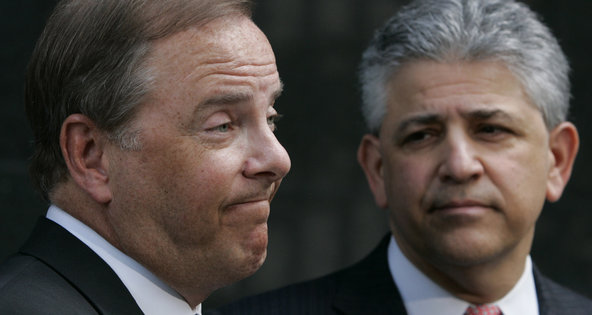 Pat Sullivan/Associated PressJeffrey K. Skilling, left, the former Enron chief executive, and his lawyer, Daniel Petrocelli, after his 2006 trial in Houston.
Pat Sullivan/Associated PressJeffrey K. Skilling, left, the former Enron chief executive, and his lawyer, Daniel Petrocelli, after his 2006 trial in Houston.
Jeffrey K. Skilling, the former Enron chief executive serving a 24-year sentence for his role in the energy company’s collapse, could be released from prison early under a possible agreement with the government, according to a notice on the Justice Department’s Web site.
Since his 2006 conviction on charges of securities fraud, conspiracy and insider trading, Mr. Skilling has served jail time in federal prisons in Minnesota and now Colorado. He and his legal team have waged an aggressive appeal, repeatedly seeking to overturn his conviction on various grounds.
Related Links
The notice, posted early Thursday, was made to notify victims of Mr. Skilling’s crimes — thousands of former Enron employees and shareholders — of any changes related to a defendant’s sentence.
“The Department of Justice is considering entering into a sentencing agreement with the defendant in this matter,” reads the notice, which was earlier reported on by CNBC. “Such a sentencing agreement could restrict the parties and the Court from recommending, arguing for, or imposing certain sentences or conditions of confinement.”
If the government decides to enter into an agreement to shorten Mr. Skilling’s sentence, it is unclear by how much it would be reduced. And any reduction would require the approval of Judge Sim Lake of Federal District Court in Houston, who presided over Mr. Skilling’s trial. (Kenneth Lay, the company’s chairman, was also found guilty but died just over a month after the trial.)
Mr. Skilling and Mr. Lay became public symbols of executive wrongdoing and financial malfeasance after the tech and telecom boom of the late 1990s turned to bust. Enron was at the center of a wave of corporate accounting scandals that emerged out of the stock market collapse. The executives, along with other prominent businessmen like Bernard Ebbers of WorldCom and John Rigas of Adelphia, were convicted by juries and received lengthy prison terms for, among other crimes, lying to their investors about the health of their companies.
After the Enron and WorldCom collapses in late 2001 punctuated the end of the historic bull market, the Bush White House took an aggressive stance on prosecuting white-collar crime. President Bush, who counted Mr. Lay as a friend and had considered him for a post in his administration, created the Corporate Fraud Task Force, which secured nearly 1,300 corporate fraud convictions, including cases against more than 200 chief executives, company presidents and chief financial officers, according to a 2008 report.
An Enron Task Force was also formed to prosecute crimes specifically connected to the energy company’s bankruptcy. The conviction of Mr. Skilling was one of about 16 that the Justice Department secured against former Enron executives, several of whom cooperated with the government and testified at Mr. Skillilng’s trial.
Mr. Skilling’s appeal gained traction with his argument that the government had relied on a dubious legal theory that Mr. Skilling deprived others of his “honest service.” In 2010, the Supreme Court called the use of the awkwardly written “honest services” law unconstitutionally vague and said his conviction was “flawed.”
But a federal appeals court subsequently ruled that the conviction was not tainted by the use of the theory and said there was “overwhelming evidence” that Mr. Skilling had conspired to commit fraud. Last year, the Supreme Court declined to hear Mr. Skilling’s appeal of the appeals court ruling.
But the federal appeals court also reiterated an earlier ruling that Mr. Skilling still needed to have his sentence re-calculated because Judge Lake had erred in his handling of another issue in the case. That re-sentencing was put on hold while the broader appeal wended its way through the courts.
Daniel M. Petrocelli, the lawyer for Mr. Skilling, did not immediately respond to a request for comment.
Article source: http://dealbook.nytimes.com/2013/04/04/enrons-skilling-could-get-early-prison-release/?partner=rss&emc=rss